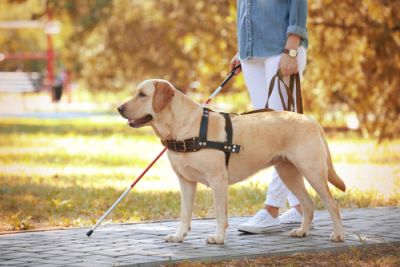 For many disabled Americans, service and emotional support animals help by performing tasks that are essential for daily living. As constant companions, these creatures assist their humans by granting greater independence, seeing to their wellbeing, and even saving their lives. If you have disabled friends or family on your wedding guest list, you’ll need to pay attention to accessibility-related issues. Understanding the law and taking some additional planning steps ensures that their service animals will be welcome as they join you on your special day.
For many disabled Americans, service and emotional support animals help by performing tasks that are essential for daily living. As constant companions, these creatures assist their humans by granting greater independence, seeing to their wellbeing, and even saving their lives. If you have disabled friends or family on your wedding guest list, you’ll need to pay attention to accessibility-related issues. Understanding the law and taking some additional planning steps ensures that their service animals will be welcome as they join you on your special day.
Service, Therapy, and Emotional Support Animals
What’s the difference between service, therapy, and emotional support animals? It’s easy to confuse these three distinctions, but they all assist disabled people in vital ways. Service animals may aid their human clients through actions such as fetching objects, guiding through crosswalks, giving reminders to take medication, alerting about dangerous conditions, or monitoring for seizures or significant drops in blood glucose levels. Psychiatric service animals sense for panic attacks and then act to prevent or mitigate these incidents.
In contrast, therapy animals usually visit hospitals, assisted living facilities, and other locales to offer relief from stress and anxiety through interaction with their clients. The American Kennel Club clarifies that emotional support animals also provide comfort for individuals with mental health challenges. Some also help neurodivergent individuals, especially autistic people who contend with anxiety. The ADA National Network supplies additional information about the differences between service and emotional support animals.
Service Animals and the Law
The Americans with Disabilities Act of 1990 defines what a service animal is and provides general guidelines for what it calls “reasonable public accommodations.” Dogs and some miniature horses that are trained to undertake specific tasks for disabled individuals fit the ADA’s definition of a service animal. Government agencies, businesses, and nonprofit organizations are required by this law to permit service animals on their premises. Service animals are trained according to the “four on the floor principle,” which means that all their paws should be on the floor unless they’re performing tasks for their human clients.
The ADA’s protections usually don’t apply to most therapy and emotional support animals. However, some jurisdictions may allow emotional support animals within public facilities. To learn about the laws in your state, consult the Nolo website.
Accommodations at Your Wedding
As you plan your big event, you’ll want to keep some tips in mind to help guests who rely on service or emotional support animals. Wedding Bee’s Laura Leavitt mentions a few useful recommendations:
- Find out what their animals need while at your venue.
- Scope out quieter areas in the venue that allow their animals a break from the action.
- If a person who depends on a service animal is in your wedding party, suggest special embellishments that match your wedding colors but won’t irritate or get in the way of the animal performing its jobs.
Before booking your wedding at a house of worship, double check to make sure that the venue will permit service animals on its premises. The network reveals that religious organizations are exempt from the ADA’s provisions, which means they are not legally mandated to be accessible or let service animals enter their facilities.
Accessibility for You and Your Guests
Service and emotional support animals play important roles in the lives of the people they assist. Ensuring that guests with these animals can attend and enjoy your wedding requires a few additional steps, but they’ll appreciate your efforts. Finding out what your invitees need, knowing applicable laws, and working with your venues will pave the way for all your guests to feel confident that they can relax and celebrate with you as you walk down the aisle.
Add Your Comment